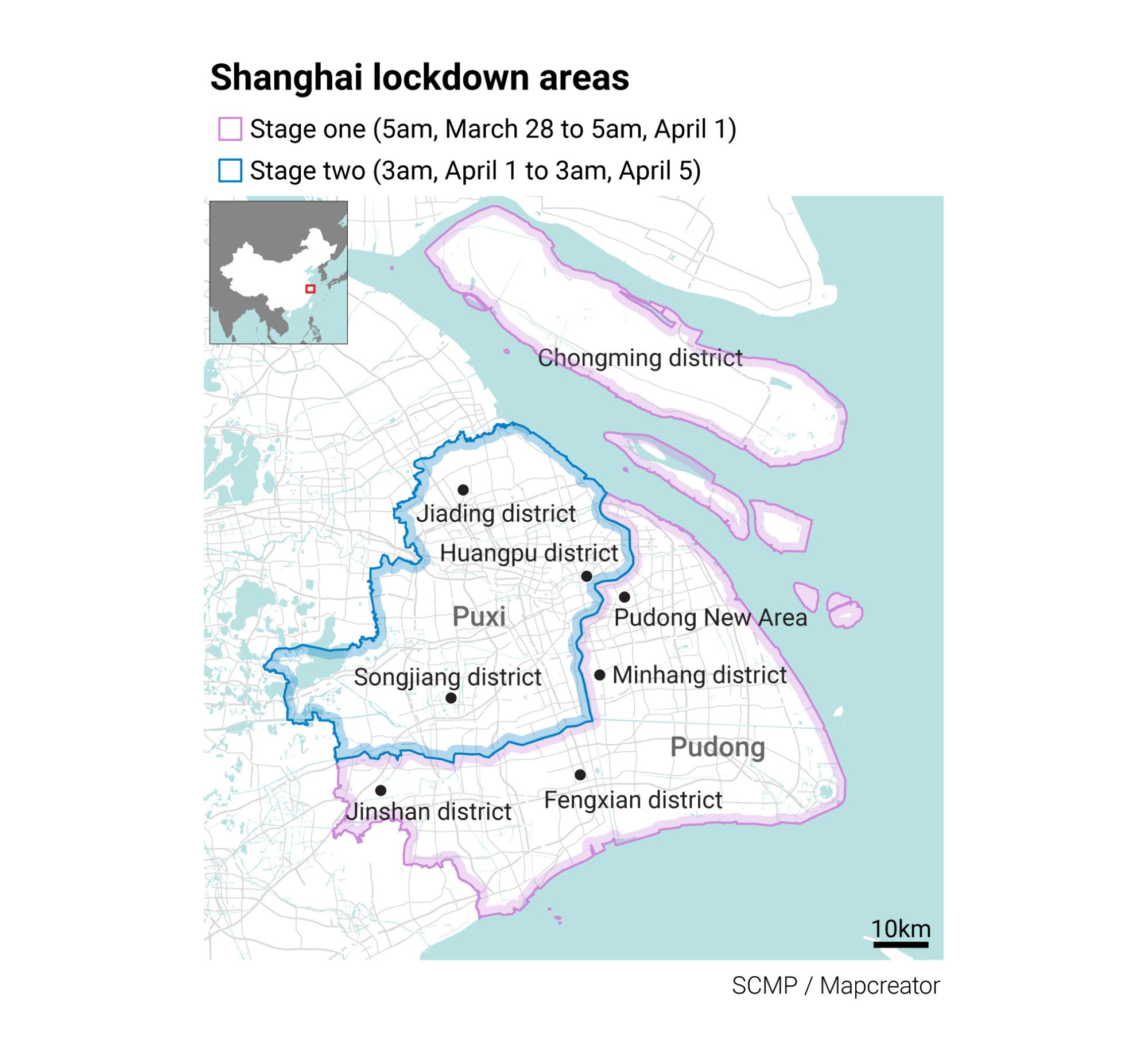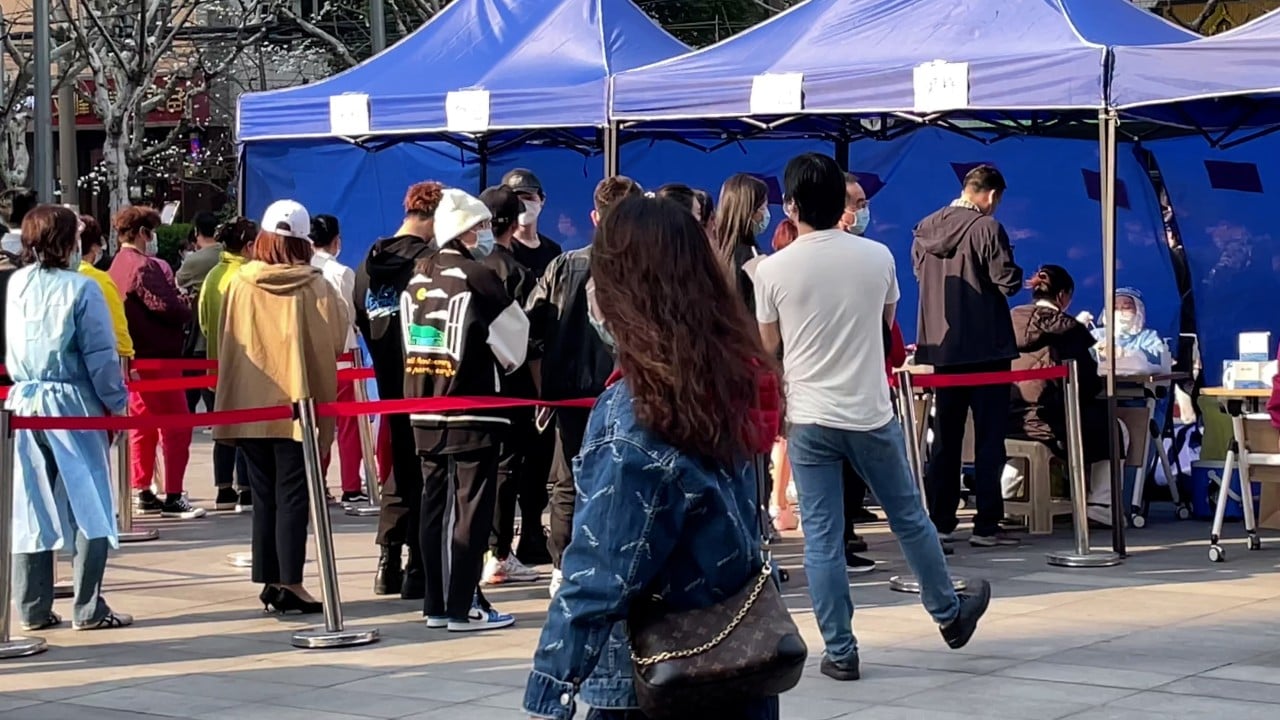
Coronavirus: a city divided, as China’s financial hub Shanghai goes into lockdown
- Millions subject to stay-at-home orders as restrictions begin to the east of the Huangpu River, with the west to follow
- City is grappling with its worst outbreak, reporting 3,500 new local cases on Monday – almost all with mild or no symptoms
For the next four days, residents will be confined to their neighbourhoods and all public transport and private cars are barred from travelling between Pudong and Puxi, though deliveries and other essential transport will continue.
In the second stage, Puxi – to the west of the Huangpu River – will go into lockdown for four days from Friday.

It came as southern tech hub Shenzhen said all operations and production would resume on Sunday, after ending a week-long lockdown.
Shanghai is grappling with its worst outbreak of Covid-19, reporting 3,500 new locally transmitted cases on Monday – almost all with mild or no symptoms. Across the country, 1,219 local cases were reported – most in the northeastern province of Jilin – and there were 4,996 local asymptomatic infections, many of them in Shanghai.
Shanghai orders Pudong lockdown in push to contain Covid-19 surge
Wu Jinglei, director of Shanghai’s health commission, said there would be two rounds of mass testing in locked down areas, and routine screening would continue elsewhere.
It is Shanghai’s largest lockdown of the pandemic, but airports, railways, international shipping and the stock exchange remain open.
In Pudong, the Shanghai Stock Exchange pulled out all the stops to keep shares trading, with hundreds of employees working in a “closed loop” – essentially living in the office – since last week.
On Monday, the benchmark Shanghai Composite Index inched up 0.1 per cent to 3,214.50 and the main gauge tracking the Nasdaq-style Star Market lost 1.5 per cent to 1,090.73.
Tesla’s Shanghai factory was among those to suspend production for four days.
Zoe Luo, who lives in the Sanlin area of Pudong, said her residential compound had been locked down since Wednesday because it was deemed a “high-risk” area. An accountant at a firm in Puxi, Luo said her main concern was not about when she could get back to work but how to get hold of supplies.
“I had stocked up with about five days’ of food and thought it would be enough, but I started worrying when the restrictions were still in place [on Sunday]. I tried ordering food online on three apps but all of them were fully booked,” said Luo, who lives with her teenage daughter and 69-year-old mother-in-law.
Her sister, who lives in Puxi, managed to send supplies on Sunday.
For some, like Emma Ma, work continues. She left her locked down residential area late on Sunday to head to the television station in Puxi where she works as a reporter, and has authorisation to stay there temporarily.
Shanghai nurse dies of asthma after Covid-19 closed emergency department
At Pudong International Airport, the cargo terminals are operating normally for now, according to Qu Yong, a senior manager dealing with air cargo business at a foreign airline. He said the terminals were under closed-loop management with only a small number of workers.
“Prevention measures such as nucleic acid testing are being strictly implemented,” he said. “We’re expecting all airlines will have to cope with staff shortages in the coming few days as many workers are now barred from entering the locked down areas [such as Pudong].”
The lockdown in Shanghai follows similar snap restrictions in Shenzhen, where community spread of the virus was largely contained after a citywide lockdown and three rounds of mass testing in a week. While buses and the subway were halted, the southern city allowed taxis to remain on the road, and residents could walk around in their neighbourhoods with a permission slip, while restaurants and supermarkets remained open. But compounds and buildings where cases have been found are still sealed off.
Lu Hongzhou, an infectious disease specialist and head of Shenzhen No 3 People’s Hospital, said Shanghai’s split lockdown was a “good way to avoid the city coming to a complete standstill” and limit the impact of the restrictions and testing blitz.
“Half of the city will go into mass testing while it will be business as usual in the other half,” Lu said.
Meanwhile, all schools in Shanghai have been conducting online learning for the past two weeks.
For kindergarten teacher Andreea, an English expatriate, the lockdown is difficult to deal with “while the rest of the world is going back to normal”.
“One of the reasons might be because China has not truly come to terms with the idea that this virus is here to stay,” she said. “When I tell the people around me that almost all of my friends back in Europe have contracted the virus, I see the horror on their faces,” said the teacher, who has lived in Shanghai for eight years.
Shanghai virus lockdowns spark ‘fear’, frustration among European businesses
Siva Ranganathan, general manager of Indian Kitchen, said his two restaurants – located in Puxi – were open for now but serving takeaways only.
“We believe the lockdown measure in Shanghai will end soon because local officials are able to mobilise the resources to put Covid-19 under control,” he said. “They have taken a concrete step towards the containment of the virus. We expect them to roll out more incentives to support small businesses after winning the battle against the coronavirus.”

Authorities are also trying to ease the strain on the health system, with the Shanghai World Expo Exhibition and Convention Centre turned into a 6,000-bed temporary hospital for people who test positive but have no or mild symptoms. At least seven other facilities across the city have been turned into sites to isolate cases, they said.
Twenty-seven hospitals have meanwhile suspended part of their services – mostly their outpatient clinics – which authorities said was “to comply with epidemic investigation work”.
Shanghai’s lockdown, which was announced late on Sunday night, sparked panic buying in the west of the city before restrictions begin there on Friday. Supermarket shelves were stripped bare as residents sought to stock up, and two men were taken away by police in Jingan district on Monday after getting into a fight at a market.
There were long queues out the front of pharmacies in Xuhui district as people tried to buy medicine, with some saying they were concerned they might not be able to get prompt treatment if they fell ill.
“I hope I won’t need it, but we have to prepare for the worst,” said one woman in a queue, surnamed Lin. “In times of such chaos, I just pray that my family members are healthy so they don’t need to see a doctor.”
Additional reporting by Daniel Ren


.jpg?itok=H5_PTCSf&v=1700020945)

